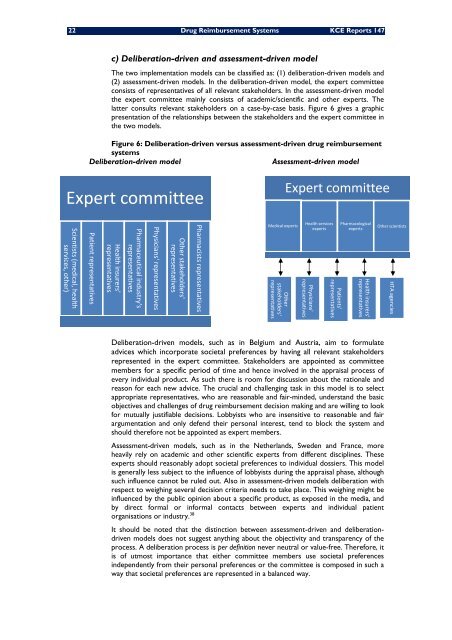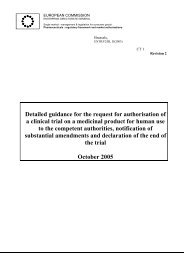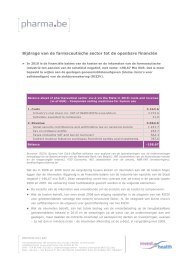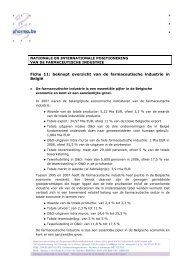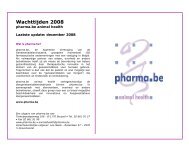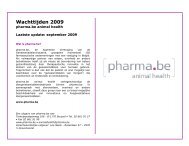Terugbetalingssystemen voor geneesmiddelen ... - Pharma
Terugbetalingssystemen voor geneesmiddelen ... - Pharma
Terugbetalingssystemen voor geneesmiddelen ... - Pharma
- No tags were found...
Create successful ePaper yourself
Turn your PDF publications into a flip-book with our unique Google optimized e-Paper software.
22 Drug Reimbursement Systems KCE Reports 147<br />
c) Deliberation-driven and assessment-driven model<br />
The two implementation models can be classified as: (1) deliberation-driven models and<br />
(2) assessment-driven models. In the deliberation-driven model, the expert committee<br />
consists of representatives of all relevant stakeholders. In the assessment-driven model<br />
the expert committee mainly consists of academic/scientific and other experts. The<br />
latter consults relevant stakeholders on a case-by-case basis. Figure 6 gives a graphic<br />
presentation of the relationships between the stakeholders and the expert committee in<br />
the two models.<br />
Figure 6: Deliberation-driven versus assessment-driven drug reimbursement<br />
systems<br />
Deliberation-driven model<br />
Assessment-driven model<br />
Expert committee<br />
Expert committee<br />
Scientists (medical, health<br />
services, other)<br />
Patient representatives<br />
Health insurers'<br />
representatives<br />
<strong>Pharma</strong>ceutical industry's<br />
representatives<br />
Physicians' representatives<br />
Other stakeholders'<br />
representatives<br />
<strong>Pharma</strong>cists representatives<br />
Medical experts<br />
Other<br />
stakeholders'<br />
representatives<br />
Health services<br />
experts<br />
Physicians'<br />
representatives<br />
Patients'<br />
representatives<br />
<strong>Pharma</strong>cological<br />
experts<br />
Health insurers'<br />
representatives<br />
Other scientists<br />
HTA agencies<br />
Deliberation-driven models, such as in Belgium and Austria, aim to formulate<br />
advices which incorporate societal preferences by having all relevant stakeholders<br />
represented in the expert committee. Stakeholders are appointed as committee<br />
members for a specific period of time and hence involved in the appraisal process of<br />
every individual product. As such there is room for discussion about the rationale and<br />
reason for each new advice. The crucial and challenging task in this model is to select<br />
appropriate representatives, who are reasonable and fair-minded, understand the basic<br />
objectives and challenges of drug reimbursement decision making and are willing to look<br />
for mutually justifiable decisions. Lobbyists who are insensitive to reasonable and fair<br />
argumentation and only defend their personal interest, tend to block the system and<br />
should therefore not be appointed as expert members.<br />
Assessment-driven models, such as in the Netherlands, Sweden and France, more<br />
heavily rely on academic and other scientific experts from different disciplines. These<br />
experts should reasonably adopt societal preferences to individual dossiers. This model<br />
is generally less subject to the influence of lobbyists during the appraisal phase, although<br />
such influence cannot be ruled out. Also in assessment-driven models deliberation with<br />
respect to weighing several decision criteria needs to take place. This weighing might be<br />
influenced by the public opinion about a specific product, as exposed in the media, and<br />
by direct formal or informal contacts between experts and individual patient<br />
organisations or industry. 38<br />
It should be noted that the distinction between assessment-driven and deliberationdriven<br />
models does not suggest anything about the objectivity and transparency of the<br />
process. A deliberation process is per definition never neutral or value-free. Therefore, it<br />
is of utmost importance that either committee members use societal preferences<br />
independently from their personal preferences or the committee is composed in such a<br />
way that societal preferences are represented in a balanced way.


